KARACHI: The Economist Intelligence Unit has ranked Karachi the second least safe city in the world after Myanmar’s Yangon on its Safe Cities Index 2021, with experts saying it wasn’t surprising given deteriorating health, security and climate conditions in the southern Pakistani port city.
The Safe Cities Index 2021 is the fourth iteration of the index, based on 76 indicators covering digital, health, infrastructure, personal and environmental security. The first such biennial report was published in 2015 but didn’t mention Karachi as it had only 50 cities.
In the next report published in 2017, the Pakistani port city was ranked as the least safe city, on 60th position. In the last index issued in August 2019, Karachi’s ranking improved and it was placed on 57th position, above Yangon, Caracas and Lagos.
This year, however, Karachi’s ranking dropped to 59 with 39.7 points in five categories. India’s New Delhi and Mumbai ranked 48 and 50, respectively. Copenhagen, Toronto, Singapore, Sydney and Tokyo are the top five safest cities in the world.
Health experts and analysts believe the grading is a reflection of reality. A spokesperson for the provincial government and the Karachi commissioner did not respond to repeated attempts to seek comment.
“The degradation is a reflection of the deteriorating situation of health in Karachi,” Dr. Qaisar Sajjad, secretary general of the Pakistan Medical Association, told Arab News. “We don’t see any steps which may make us see any better conditions in the future.”
Health and climate conditions had deteriorated with the passage of time, according to Sajjad, and the price of medical treatment had shot up manifolds in both public and private sector hospitals of the city.
“Government-run hospitals used to offer free treatment and would provide immediate health care, especially in case of emergencies,” Dr. Sajjad said, recalling a recent traffic accident at the city’s Liaquatabad flyover in which the injured died after four hospitals, two of them from the public sector denied him treatment. Government-run hospitals have also started charging heavily for tests and hospitalization, he noted.
Highlighting a lack of preventive steps by the government, the PMA secretary general said: “The sewerage system is fragile, pure drinking water is unavailable and there is abundance of mosquitos due to which health care facilities receive more patients of mosquito-borne diseases.”
Karachi has seen environmental degradation too and the city has transformed into a concrete jungle after massive cutting of trees, Sajjad said.
“There is noise and air pollution. Trash is not disposed of properly and it’s burnt instead. Car emissions are also adding to pollution in the city,” he said. “So, how can we be hopeful when we see deterioration in health and climate?”
In its report, the Economist Intelligence Unit said all categories were correlated and even when one was affected, it compromised the overall security of citizens. Experts agreed that all indicators presented a grim picture of the Pakistani port city and main financial hub.
“No serious efforts have been made for the security of the city,” Mazhar Abbas, a Karachi-based political commentator and analyst, told Arab News. “Around $124 million were spent on the safe city project in Islamabad, whereas $157 million were allocated for the Lahore Safe City Project. On the contrary, in Karachi, which is a much bigger city, only Rs600 million ($3.57 million) were spent to install cameras. It tells about our priorities for Karachi.”
Though a September 2013 paramilitary operation eliminated much violence from the city, no serious efforts had been made against street crimes, he said.
“Karachi is witnessing a surge in these crimes,” Abbas said. “Most of the criminals have been released on bail for as much as 12 times, but authorities don’t look at this issue scientifically.”
He said the dilapidated infrastructure was also adding to the lack of security for the city’s dwellers: “Karachi, which had few slums in the 1980s, is now home to over 8,000 shanty towns.”
The analyst said the Rangers paramilitary force had been deployed in Karachi as part of a temporary arrangement, but over the last several decades it started policing the city’s neighborhoods, while the police force was never reorganized or restructured to deal with modern-day challenges facing the city.
Experts call Karachi’s ranking as world’s second least safe city a ‘reflection’ of reality
https://arab.news/btvb5
Experts call Karachi’s ranking as world’s second least safe city a ‘reflection’ of reality
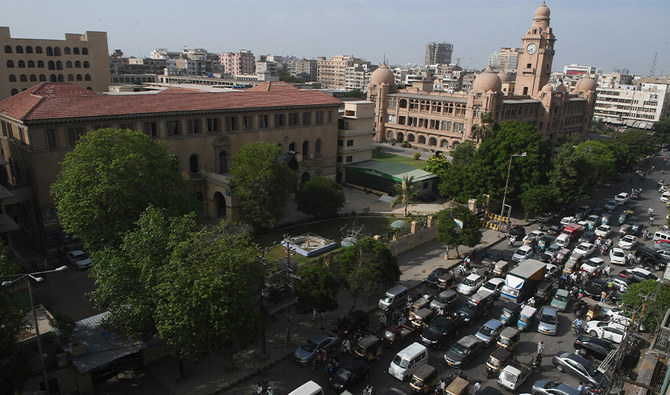
- Safe Cities Index 2021 is based on 76 indicators covering digital, health, infrastructure, personal and environmental security
- Experts agree that all indicators presented a grim picture of the Pakistani port city and main financial hub
Senior World Bank official concludes Pakistan trip, reaffirms support for economic stability
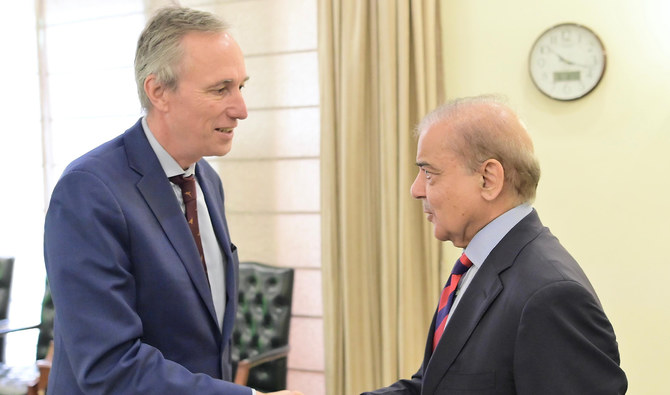
- World Bank Vice President for South Asia Martin Raiser meets PM Sharif, key officials in Islamabad
- Raiser praises Pakistan’s reform plans to boost growth, attract private investment and tackle poverty
KARACHI: A senior World Bank official concluded his three-day visit to Pakistan on Wednesday, reaffirming the international institution’s support for the country’s economic stabilization after meeting Prime Minister Shehbaz Sharif and key government officials in Islamabad.
World Bank Vice President for South Asia Martin Raiser arrived in the federal capital on May 6, with his visit taking place as Pakistan faces a chronic balance of payment crisis, forcing it to turn to the International Monetary Fund (IMF) for a new long-term bailout deal.
Pakistan has faced the challenges of revenue generation and government expenditure in the past and struggled with high levels of debt, a large fiscal deficit and an ongoing need for structural reforms to improve its fiscal sustainability.
“The World Bank Vice President for South Asia, Martin Raiser, concluded his three-day visit to Pakistan today and reaffirmed the World Bank’s support to stabilize the economy and accelerate inclusive and resilient growth,” a press release by the international institution read.
It said Raiser met Sharif, ministers of finance, water, power, energy, and petroleum, and his counterparts to discuss Pakistan’s development priorities.
“The discussions focused on economic and fiscal reforms, human capital development, adaptation to climate change, energy sector reforms, and digitalization as a foundational enabler and accelerator of development,” the World Bank added. \
Raiser said he was pleased to learn of Pakistan’s reform plans to boost growth and attract private investment, strengthen climate resilience, and invest in human capital to tackle daunting challenges such as child stunting and poverty.
The World Bank official also visited Pakistan’s northwestern Khyber Pakhtunkhwa (KP) province to meet Chief Minister Ali Amin Gandapur.
“Discussions focused on the provincial developmental priorities and how can the World Bank step up its support in key sectors, like education, water and sanitation, health, rural roads, and livelihoods,” the statement said.
He also attended a national conference on education in Islamabad, where PM Sharif also spoke. Raiser reaffirmed the World Bank’s commitment to urgent action to tackle the large number of out-of-school children in Pakistan.
PM Sharif declares ‘education emergency’ across Pakistan to enroll out-of-school children
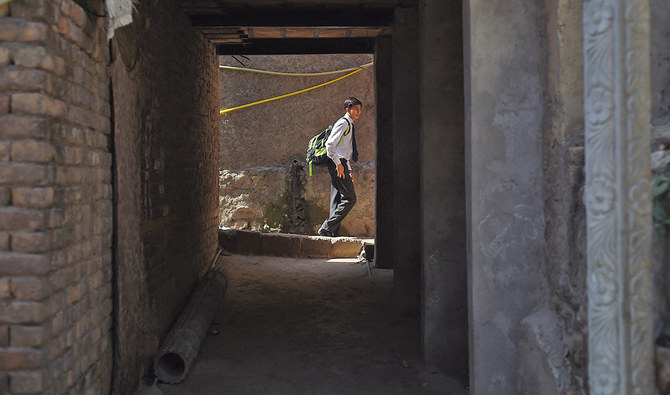
- Pakistan has one of the world’s highest out-of-school children population at 26.2 million
- PM Shehbaz Sharif says will personally oversee the national program to ensure its success
ISLAMABAD: Prime Minister Shehbaz Sharif on Wednesday declared an “education emergency” across Pakistan on Wednesday, vowing to personally oversee the program which he hoped would enroll over 26.2 million out-of-school children in educational institutions.
Pakistan has the second-highest population of out-of-school children in the world at 26.2 million, according to Unicef Pakistan. Pakistani experts have identified population growth, lack of localized strategies, and economic issues as the main reasons why over 26 million Pakistani children are not enrolled in schools across the country.
A report by Pakistan’s education ministry in January revealed that out of 26.2 million out-of-school children, 11.73 million are in Punjab, 7.63 million in Sindh, 3.63 million in Khyber Pakhtunkhwa (KP) and 3.13 million in Balochistan province.
Speaking at an event titled “National Conference on Education Emergency,” Sharif said enrolling millions of children back into schools was a “tall order” that could be achieved with conviction.
“I declare from this moment an emergency in education all over Pakistan,” Sharif told members of the conference, which included federal ministers, parliamentarians, vice-chancellors, and diplomats.
The Pakistani prime minister said he would personally oversee the national program, adding that he would meet the chief ministers of all four provinces in the country for the sake of Pakistani children and their future.
“This is about our children and our future,” Sharif said. “This is a very challenging task, no doubt. But nations which had faced difficulties and defeat in the past arose from the ashes of defeat.”
He hoped provincial governments in Pakistan would help the center in achieving its goal of promoting education in the country and transforming it into an educated nation.
“I guarantee, if we move in unison to find our space, Pakistan will become one of the most educated societies one day soon,” he remarked.
Pakistan’s first lunar satellite ICUBE-Q successfully enters moon’s orbit
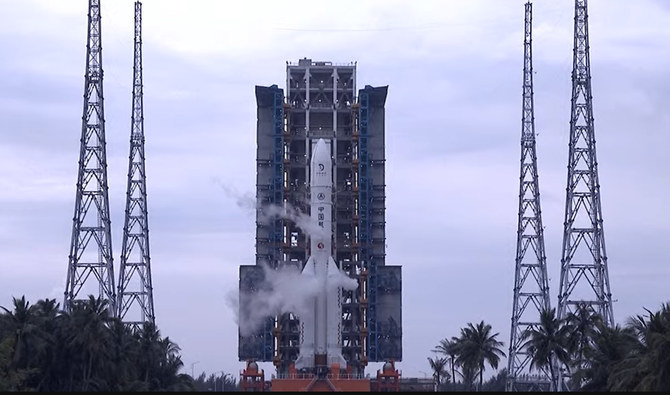
- ICUBE-Q was deployed in moon’s orbit around 1:14 p.m. Pakistan Standard Time, says Institute of Space technology official
- IST official describes development as “important” one for Pakistan allowing it to conduct “bigger” space missions in future
Islamabad: Pakistan’s first lunar satellite ICUBE-Q entered the moon’s orbit successfully today, Wednesday, a senior official of the country’s Institute of Space Technology (IST) confirmed, saying the “important” development could pave the way for “bigger” space missions for the country in the future.
The ICUBE-Qamar satellite carries two optical cameras to image the lunar surface and weighs around 7kg. Cubesats are tiny box-shaped satellites that are mainly launched into low Earth orbit to observe the Earth, test new communications technology, or perform miniature experiments.
Pakistan’s first lunar satellite was launched aboard China’s Chang’e-6 probe on May 3. The Chinese probe is tasked with landing on the far side of the moon, which perpetually faces away from the Earth, after which it will retrieve and return samples. China is the first country to make such an ambitious attempt.
“Our ICUBE-Q was deployed successfully in its orbit at 1:14 p.m. Pakistan Standard Time,” Dr. Khurram Khurshid, the head of the electrical engineering and computer science department at IST and a co-lead on the satellite project, told Arab News.
Dr. Khurshid said Pakistani officials will continue to test the satellite’s system for the next three to four days. He said initial tests revealed there were no complications with the cubesat’s system.
The IST official said the development means Pakistan is officially in an exclusive club of countries that have conducted deep space missions.
“This is the first step, a step in the right direction,” Dr. Khurshid noted. “It can lead to bigger space missions, such as landing on the moon or various other experiments.”
Dr. Khurshid said Pakistan would be able to share images from the satellite by May 15.
Around 100 students from IST contributed to developing the satellite. Pakistan’s proposal to build the satellite was accepted by the China National Space Agency (CNSA) from plans submitted by eight member states of the Asia-Pacific Space Cooperation Organization (APSCO).
The design, development, and qualification of the ICUBE-Q satellite were spearheaded by faculty members and students of the IST in collaboration with China’s Shanghai Jiao Tong University (SJTU), with support from Pakistan’s National Space Agency, SUPARCO.
The ICUBE-Q has two cameras as payload for taking images of the lunar surface that will be transmitted back to Earth for analysis.
Taliban deny Pakistani claims of Afghan involvement in attack on Chinese workers

- According to Islamabad, bombing that killed five Chinese in Pakistan was planned in Afghanistan
- Afghan defense ministry says the March attack showed weakness of Pakistan’s security agencies
KABUL: The Taliban rejected on Wednesday allegations of Afghan involvement in a recent deadly attack on Chinese workers in neighboring Pakistan.
The five Chinese nationals, who were employed on the site of a hydropower project in Dasu in northwestern Khyber Pakhtunkhwa province bordering Afghanistan, were killed alongside their driver in a suicide blast on March 26.
Pakistan’s military said on Tuesday that the attack was planned in Afghanistan and that the attacker was an Afghan citizen.
Maj. Gen. Ahmad Sharif, a spokesperson for Pakistan’s army, also told reporters that Islamabad had “solid evidence” of militants using Afghan soil to launch attacks in Pakistan, that since the beginning of the year such assaults had killed more than 60 security personnel, and that authorities in Kabul were unhelpful in addressing the violence.
The Taliban’s Ministry of Defense responded on Wednesday that the claims were “irresponsible and far from the reality.”
“Blaming Afghanistan for such incidents is a failed attempt to divert attention from the truth, and we strongly reject it,” Enayatullah Khwarazmi, the ministry’s spokesperson, said in a statement.
“The killing of Chinese citizens in an area of Khyber Pakhtunkhwa which is under tight security cover of the Pakistani army shows the weakness of the Pakistani security agencies or cooperation with the attackers.”
The Dasu attack followed two other major assaults in regions where China has invested more than $65 billion in infrastructure projects as part of its wider Belt and Road Initiative.
On March 25, a naval air base was attacked in Turbat in Pakistan’s Balochistan province, and on March 20, militants stormed a government compound in nearby Gwadar district, which is home to a Chinese-operated port.
Pakistan is home to twin insurgencies, one by militants related to the Tehreek-e-Taliban Pakistan — the Pakistani Taliban — and the other by ethnic separatists who seek secession in southwestern Balochistan province, which remains Pakistan’s poorest despite being rich in natural resources.
While the attacks in Balochistan were claimed by the Baloch Liberation Army — the most prominent of several separatist groups in the province, no group claimed responsibility for the one in Dasu.
Blaming it on Afghanistan, however, was “baseless,” according to Naseer Ahmad Nawidy, international relations professor at Salam University in Kabul.
“The insurgency in the region has existed for very long now and cannot be attributed to a specific area or country. Pakistan looks at the Islamic Emirate in its current form as a threat to its interests. The Pakistan government needs to develop its relations with the Islamic Emirate based on equal rights and good will for stability in the whole region,” Nawidy told Arab News.
“Stability in the region requires mutual cooperation and trust. The governments in Afghanistan and Pakistan must end the relations crisis at the earliest. Repeating such claims will further increase the tensions and may cause enmity between the two countries.”
Abdul Saboor Mubariz, political scientist and lecturer at Alfalah University in Jalalabad, said Pakistan’s claims were meant to put pressure on the Taliban to help Islamabad in its campaign against the TTP.
“Pakistan’s government is using different forms of pressure such as forcible deportation of Afghan refugees, claims about security threats from Afghanistan, closing border points and creating challenges for Afghan traders,” he said, adding that accusations and claims of links to attacks were affecting the Taliban administration as it still sought recognition from foreign governments.
“The claims are critical for the Islamic Emirate as it is seeking engagement with the countries in the region and across the globe, while the government remains unrecognized by all world countries.”
First Makkah Route Hajj flight to depart from Karachi airport tomorrow
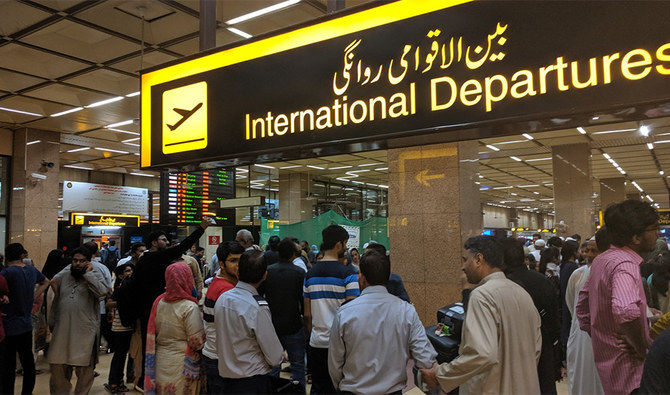
- First 11 Hajj flights carrying 2,160 Pakistani pilgrims scheduled to land in Madinah on Thursday
- Makkah Route Initiative was recently expanded to Karachi, previously available in Islamabad
KARACHI: Pakistan will launch its month-long Hajj flight operation from tomorrow, Thursday, with 11 flights scheduled to arrive in Madinah from five major Pakistani cities, including Karachi where passengers will utilize the Makkah Route Initiative for the first time.
Pakistani officials last month confirmed Saudi Arabia’s decision to expand the Makkah Route Initiative, previously available in Islamabad, to the airport in Karachi, the country’s largest and most populous city.
Launched in 2019, the Makkah Route Initiative allows for the completion of immigration procedures at the pilgrims’ country of departure, making it possible to bypass long immigration and customs checks on reaching Saudi Arabia. The facility significantly reduces waiting times and makes the entry process smoother and faster.
“These flights will transport pilgrims from Islamabad, Karachi, Lahore, Multan, and Peshawar to the Prince Mohammad Bin Abdulaziz International Airport (Madinah Airport), beginning a massive influx of devotees from Pakistan and other parts of the world,” state news agency APP said, adding that the first 11 flights would take 2,160 Hajj pilgrims to Madinah.
The agency reported that Nawaf bin Said Al-Malki, Saudi Arabia’s ambassador to Pakistan, would visit the Islamabad and Karachi airports, both now operated under the Makkah Route Initiative, to bid farewell to Pakistani Hajj pilgrims.
“The pilgrims will be received by authorities concerned at the Pakistan Consulate General and the Hajj Mission of the Ministry of Religious Affairs,” APP added.
Under the Hajj flight operation, five airlines – Pakistan International Airlines, Saudi Airlines, Airblue, Serene Air, and Air Sial – will operate 259 sorties to transport around 68,000 intending pilgrims from eight major cities of Pakistan, namely Islamabad, Karachi, Lahore, Peshawar, Multan, Quetta, Sialkot, and Sukkur, to Jeddah and Madinah under the government scheme.
According to the flight schedule, the first flight, PF754 (AirSial), is scheduled to depart for Madinah at 01:45 am from Karachi, carrying around 150 intending Hajj pilgrims. The last Hajj flight, SV3727 (Saudi Airlines), will depart on June 10 from Islamabad to Jeddah, with 380 passengers onboard.
During the first 15 days, all flights will operate from various cities of Pakistan to Madinah until May 23, and afterwards, they will land at the King Abdulaziz International Airport, Jeddah, until the completion of the Hajj flight operation.
This year, around 179,210 Pakistanis will perform Hajj under both the government and private schemes, for which a month-long flight operation is scheduled to commence on May 9, tomorrow.
Out of 179,210 pilgrims, 89,605 each will embark on the holy journey under the government and private schemes, while a quota of 25,000 and 44,802 pilgrims, respectively, have been allocated to the sponsorship schemes.











